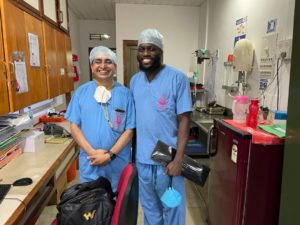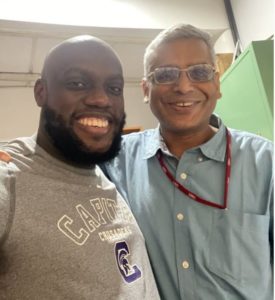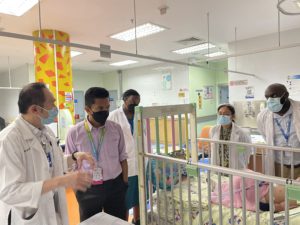![]() Published June 2, 2022
Published June 2, 2022

“When I sit back and analyze where I am right now, I can’t believe I learned that much. I learned that it’s very possible, even with limited resources, to improve and build a pediatric cardiac care program,” says Dr. Othin Moses from Uganda upon reflecting on his first year of his Children’s HeartLink fellowship in India. Dr. Moses is the only anesthesiologist in Uganda specializing in pediatric cardiac intensive care and upon completion of his fellowship will return to Uganda Heart Institute in Kampala, one of the few hospitals conducting heart surgeries on children in the region of east-central Africa.
When Dr. Othin Moses, an anesthesiologist at Uganda Heart Institute in Kampala, saw a fellowship opportunity in pediatric cardiac care, he knew it was fate. He had been working in cardiac care for several years and always desired to learn more about the pediatric cardiac care side.
He applied and when accepted to the Children’s HeartLink pediatric cardiac intensive care fellowship, he committed to a two-year experience training for one year in India and another in Malaysia at Children’s HeartLink Centers of Excellence Amrita Institute of Medical Sciences (AIMS) and Insitut Jantung Negara (IJN), respectively.
The first year | Pediatric cardiac intensive care fellowship

In March 2022, Dr. Moses had one year of his fellowship under his belt and was on his way to becoming the first anesthesiologist specializing in pediatric cardiac intensive care in Uganda. But that isn’t what Dr. Moses talks about. Instead, you’ll hear how eager he is to share the knowledge he’s gained with his colleagues and health care community in his home country. To him, his fellowship is about helping reach and serve more children with congenital heart disease and helping his country attract more professionals to the field to provide such care.
“I learned that it’s very possible, even with limited resources, to improve and build a program. We need the entire team to move at the same pace,” says Dr. Moses. “There are opportunities and people who are willing to assist us and offer training to teach us. It will take some time to be able to train and move the needle in Uganda, but this will keep us moving forward.”
Dr. Moses remained focused on finding opportunities to improve protocols, systems and trainings during his time with the cardiac care team at AIMS. He spent time understanding the systems in place and asked questions of the cardiac care team to better understand exactly what it took to achieve their success.
“My learning curve was almost vertical for the first three months in India. The team was very welcoming. I was learning a lot and they were incorporating me into various settings quite well,” says Dr. Moses. “After three months, I felt like I was in a much better place. My supervisor said that I’d grown up fast.”

Dr. Krishna Kumar, pediatric cardiologist at AIMS says, “Dr. Moses thoroughly impressed us with his diligence, knowledge, understanding and commitment. We are certain that he will be a great resource for Uganda when he returns and he will help enable the development of pediatric cardiac intensive care unit that is vital to the care of children with heart disease.”
Dr. Moses feels the experience he’s gained from being in a multi-disciplined pediatric cardiac care clinical setting provided insights on how to better advocate for his program back home. Whether it’s advocating for additional support from the administration, using his gained knowledge to lay the groundwork for a stronger pediatric intensive care unit or establishing systems that provide opportunity for more children to be served.
Overcoming heart care challenges in Uganda
Uganda has less than 5,000 medical doctors* treating a population of nearly 45 million people. Because of limited access to pediatric health care or pediatric hospitals specializing in heart care and skilled professionals the mortality rate for children born with congenital heart disease is high.
The Uganda Heart Institute, where Dr. Moses works, is the only cardiac care center in the country. They have one operating room with two surgical days every week. Those two days are shared between children and adults—meaning there are just four days a month a child could have heart surgery. That window becomes smaller if any given surgery or recovery takes longer than expected.
“Our work can only be done as a team. It becomes more difficult to treat patients with heart defects because this is specialized care. It’s different than being treated at a normal hospital,” says Dr. Moses.

At Uganda Heart Institute, the intensive care unit (ICU) is staffed by two surgeons who specialize in pediatrics, three fellows who are trained and about 16 nurses. The first open heart surgery was performed in 2007. Dr. Moses estimates that in a year timeframe they now perform about 60-70 open heart surgeries on children.
With so few children undergoing pediatric surgery, the fellows have limited exposure to surgeries and complex cases. Other challenge the team faces is a lack of available blood products or difficulty finding a central line on a child, which can take hours to complete. Both can result in surgeries being cancelled.
While the government offers subsidies to help offset the cost for heart care, it still places a major financial burden on families for their children with congenital heart disease. Oftentimes, when families can afford surgery, the limited operating days make it difficult to secure a date and time. In addition, if a heart surgery case is more difficult than anticipated, it may delay or result in the next surgery being cancelled or postponed.
Yet, there are many more who are awaiting care.
The making of the future heart hero for Uganda

Dr. Moses began the final year of his fellowship at Children’s HeartLink Center of Excellence IJN in Malaysia in March 2022.
“AIMS was a very good stepping stone. When I sit back and analyze where I am right now, I can’t believe I learned that much,” says Dr. Moses. “My supervisor’s assessment helped me continue to learn what I can do better and helped to direct my learning because it’s challenging being away from home for so long.”
“It was a privilege for us to have Dr. Moses spend a year with us as a part of the Children’s HeartLink fellowship in pediatric cardiac intensive care. He made the most of the learning opportunities through his intense involvement in the care of patients and participation in academic sessions,” said Dr. Kumar.
The doctors, nurses and health care teams in India and Malaysia faced similar challenges as Dr. Moses years ago. They have proven that children’s hospitals in low- and middle-income countries can successfully implement pediatric cardiac care programs with support from their peers and Children’s HeartLink. They offered Dr. Moses a first-hand look at their systems and processes in place and what it took to create a team that not only serves their community and region but also shares their expertise with those in similar surroundings.
The challenges Dr. Moses faces when he returns home is using his knowledge and skills gained to advocate, educate and advance pediatric heart care in his own country.
Read more about Children’s HeartLink Center of Excellence Amrita Institute of Medical Sciences (AIMS) in Kochi, India and read how our Center of Excellence in Malaysia helps improve cardiac programs in several countries.
About the Children’s HeartLink Fellowship in Pediatric Cardiac Sciences
The Children’s HeartLink fellowship program aims to provide training to individuals who are willing to dedicate themselves to a career in pediatric cardiac sciences to address the gap in pediatric cardiac care providers in low- and middle-income countries. Fellowship opportunities are offered to medical professionals from low- and middle-income countries in subspecialities including Pediatric Cardiology, Pediatric Cardiac Surgery and Pediatric Cardiac Intensive Care. For more information, contact Bistra Zheleva.
*https://human-resources-health.biomedcentral.com/articles/10.1186/s12960-021-00634-8; https://apps.who.int/iris/bitstream/handle/10665/348855/9789290234555-eng.pdf?sequence=1&isAllowed=y
